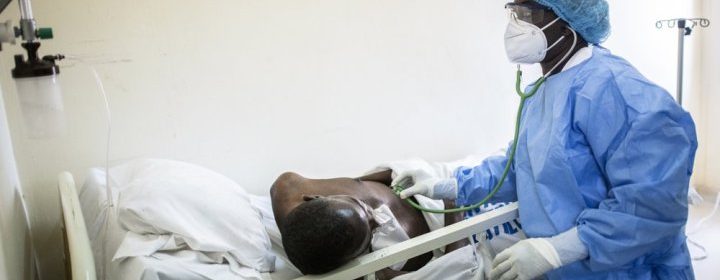Cheap drug could help save lives from coronavirus, early study results show

An affordable steroid, dexamethasone, might be the first drug proven to improve survival of those with COVID-19, researchers in the U.K. say.
A research team from the University of Oxford announced the results in a press release Tuesday, though full results have not yet been published.
In a trial of 2,104 patients who received either low-dose dexamethasone or usual care, dexamethasone reduced deaths by one-third in patients who required ventilation and one-fifth in patients who required supplemental oxygen.
The researchers found no effect among patients who did not require respiratory support.
“Based on these results, one death would be prevented by treatment of around eight ventilated patients or around 25 patients requiring oxygen alone,” the researchers wrote in their statement.
“Dexamethasone is the first drug to be shown to improve survival in COVID-19. This is an extremely welcome result,” chief investigator Peter Horby, an emerging infectious diseases professor at the University of Oxford, said in a statement.
[ Sign up for our Health IQ newsletter for the latest coronavirus updates ]
“The survival benefit is clear and large in those patients who are sick enough to require oxygen treatment, so dexamethasone should now become standard of care in these patients. Dexamethasone is inexpensive, on the shelf and can be used immediately to save lives worldwide.”
Even though the drug only helps in severe cases, “countless lives will be saved globally,” said Nick Cammack of Wellcome, a British charity that supports science research.
“Dexamethasone must now be rolled out and accessed by thousands of critically ill patients around the world,” said Cammack, who had no role in the study. “It is highly affordable, easy to make, can be scaled up quickly and only needs a small dosage.”
Dexamethasone is a corticosteroid typically used to reduce inflammation, according to information from the Mayo Clinic. It’s used to treat conditions like allergies, asthma, arthritis, kidney problems and flare-ups of multiple sclerosis.
This is the same study that earlier this month showed the malaria drug hydroxychloroquine was not working against the coronavirus. The study enrolled more than 11,000 patients in England, Scotland, Wales and Northern Ireland who were given either standard of care or that plus one of several treatments: dexamethasone, the HIV combo drug lopinavir-ritonavir, the antibiotic azithromycin, the anti-inflammatory drug tocilizumab or plasma from people who have recovered from COVID-19 that contains antibodies to fight the virus.
More to come.
Questions about COVID-19? Here are some things you need to know:
Symptoms can include fever, cough and difficulty breathing — very similar to a cold or flu. Some people can develop a more severe illness. People most at risk of this include older adults and people with severe chronic medical conditions like heart, lung or kidney disease. If you develop symptoms, contact public health authorities.
To prevent the virus from spreading, experts recommend frequent handwashing and coughing into your sleeve. They also recommend minimizing contact with others, staying home as much as possible and maintaining a distance of two metres from other people if you go out. In situations where you can’t keep a safe distance from others, public health officials recommend the use of a non-medical face mask or covering to prevent spreading the respiratory droplets that can carry the virus.
For full COVID-19 coverage from Global News, click here.
— With files from the Associated Press
Source: Read Full Article